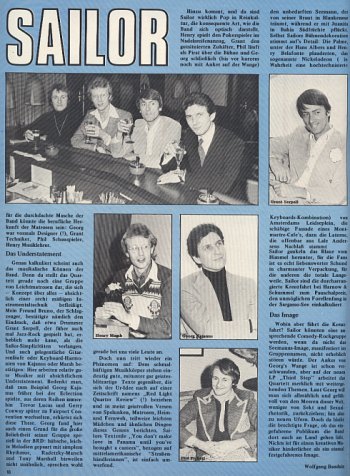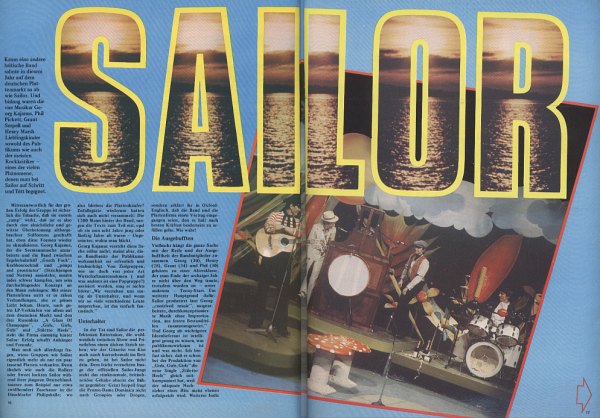 Jointly
responsible for the big success of the band is certainly
the fact that they seem rather "camp", that
they have managed to update certain traditional styles,
by using an intentional and shrewd overemphasis for those
styles. Georg Kajanus, who worked out the details of the
SAILOR idea and put the band somewhere between the ship
"Gorch Fock", shrimp-cocktails and "pimps
and prostitutes", had to fight very hard to get
people interrested in his sweeping concept: He argued with his record
company for a long time before he got the deal. Today,
after good LP-ales especially on the German market and
the three big hits "A Glass Of Champagne",
"Girls, Girls, Girls" and "Stiletto
Heels", the label sticks completely to SAILOR:
Success creates followers and friends. Jointly
responsible for the big success of the band is certainly
the fact that they seem rather "camp", that
they have managed to update certain traditional styles,
by using an intentional and shrewd overemphasis for those
styles. Georg Kajanus, who worked out the details of the
SAILOR idea and put the band somewhere between the ship
"Gorch Fock", shrimp-cocktails and "pimps
and prostitutes", had to fight very hard to get
people interrested in his sweeping concept: He argued with his record
company for a long time before he got the deal. Today,
after good LP-ales especially on the German market and
the three big hits "A Glass Of Champagne",
"Girls, Girls, Girls" and "Stiletto
Heels", the label sticks completely to SAILOR:
Success creates followers and friends.
But you also have to wonder why bands like SAILOR manage
to sell any more than a few thousand records. For
example, as well as the Rollers or Sweet, SAILOR only
managed to get about twelvethousand visitors into the
Philipshalle in Düsseldorf during their last German
tour; so where are the record buyers?? There were no
"coincidence-visitors" either: The 1200 people
behind the band sang along to all the lyrics, no matter
whether they were eight or fifty years old -
Contradiction wherever you look. Georg Kajanus doesn't
understand this himself, but he thinks that the wide
range of the audience that they attract is enjoyable and
intended. He doesn't want to hear anything about target
groups for which any kind of business company aims (and
what else is a popgroup?): "We see ourselves only as
entertainers, and if we can attract so many different
people, that's simply fantastic."
Entertainer
In fact SAILOR are the perfect entertainers, who
prudently draw a line between show and private life; they
would never go to bed with their stage make-up like e.g.
the guitarrist of Kiss. In contrast to the slightly wicked image of the official SAILOR-boys
there is the normal, British-serious behaviour aside from the stage: Grant Serpell
doesn't ask the promotion-crew-lady Dominica for groupies
or drugs, but explains in "Oxford-English" that
the band and the record company have signed a contract
that both sides should try to fulfil as good as possible.
How true!
Savvy
Maybe this is just because of the maturity and Savvy of the band members. Georg (30),
Henry (28), Grant (34) and Phil (30) belong to the same
age group, those guys that you didn't trust when seeing
them on the streets in the last 60s; and in spite of this
they became - among others - teeny-stars. Another
important reason for this: According to Georg SAILOR produces
"contrived music", elaborated, conceptual music
without improvisation, consisting of solid components.
And Georg, the most important idea-suplier, is inteligent
enough to know what is effective on the audience and what
isn't. I'm pretty sure that he has composed the new
single "Stiletto Heels" at the same time during
the production of "Girls, Girls, Girls",
because the adequate successor of a hit is to become
successful as well most of the time. Another indication
for the thought-out behaviour of the band could be the
professional backgrounds of the SAILORs: Georg once was a
designer (!), Grant technician, Phil actor, Henry music
teacher.
Understatement
The musical competence of the band also seems to be
accurately calculated. They claim to be a group of
ordinary seamen, who - the concept is important -
intentionally use rather moderate instrumental technics.
My friend Bruno, the drummer, has confirmed the
impression that drummer Grant Serpell, who used to play
jazz-rock before, can do much more that the
SAILOR-simplicities demand. And also casual
keyboard-harmonies from Kajanus or Marsh prove: Here are
some relatively good musicians at work, but with an
intentional understatement. Considering the fact that
Georg Kajanus once played in Eclection, from where people
like Trevor Lucas and Gerry Conway later went on to
Fairport Convention, this theory is approved. Georg has
also discovered a reason for the huge popularity of his
band especially in Germany: pretty, light melodies with
simple rhythms, sometimes similar to the
"Radetzky-Marsch" and Tony Marshall, seem to
appeal to a lot of people over here.
But there's another phenomenon: On the one hand there's
the rather narrow music, on the other hand good,
sometimes even brainstorm-line lyrics, that had their
original inspiration from a magazine named "Red
Light Quarter Review" (!) and deal with brilliant
verses about pubs, sailors, homesickness and wanderlust,
light girls and similar thing from this genre. SAILOR's
line "You don't make love in Panama until you've
brought a camera", which alludes to middle-Americam
"street-chandler-girls" is simply stunning.
In addition to this, and in this case SAILOR are pop in
its pure culture, is the consequent way in which the band
presents itself optically. Henry plays the poker-player
in the pinstripe-suit, Grant the well-off pimp, Phil
walks across the stage as a pirate, and Georg (who used
to wear an anchor on his cheek) the unbedarften sailor,
who dreams of his bride in Blankenese while he's picking
tropical fruits with Juaniti in Bahia. Even SAILOR's
stage decoration makes sense: The palmtree, under which
Hans Albers and Harry Belafonte used to talk, the
so-called Nickelodeon (actually a high-engineered
keyboard-combination) from Amsterdam's Leidseplein, the
shabby facades of a Montmartre-café, together with
streetlamps that seem to come from the inheritance of
Lale Andersen.
SAILOR juggle and promise heaven and earth, for the fans
it's truely adorable shoddy in a charming packaging, for
others it's just totally boring. SAILOR are the
well-arranged all-inclusive cruise at "Harnow &
Schummel", including the impossible trout-fishing at
the Sargasso-lake.
Image
But where does the cruise lead? SAILOR could become an
appealing comedy-rock-group, if there wasn't the
sailor-image, manifested in the name of the band, which
might be disturbing. The anchor on Georg's cheek has
already disappeared, but on the new LP "Third
Step" the quartet noticeably works with continuative
topics. According to Georg they gradually and lyrically
want to leave the seas of this world, although not the
champagne and sexual-rhetoric; off to new shores. But
there remains the legitimate question whether the
deadlocked audience is going to allow the band to come to
the land. Nothing is as debilitating for a creative
musician as a deadlocked image.
|
